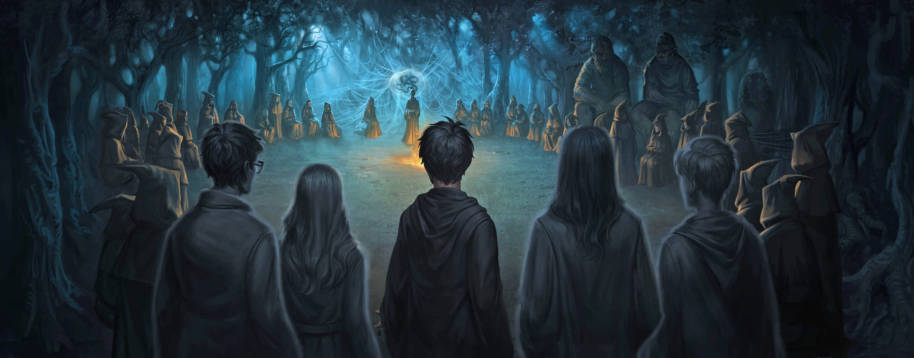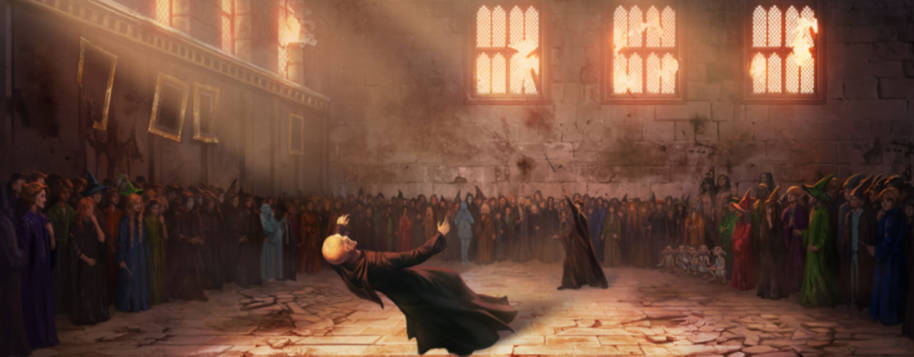
‘So, you came back, didn’t you?’ said Harry urgently. ‘People can come back, right? As ghosts. They don’t have to disappear completely. Well?’ he added impatiently, when Nick continued to say nothing.
Harry Potter and the Order of the Phoenix

It was a heartbreaking moment for Harry (and us). For an instant after Sirius’s death, Harry thought he could have his godfather back in another form. But Nearly Headless Nick dashed all hope of Sirius returning as a ghost and revealed that ghosts weren’t exactly alive. They existed neither here nor there and were only imprints of their former selves. They couldn’t move on from Earth because of unfinished business – in Nick’s case, fear of death – and dwelled in old resentments for centuries. Was this really a ‘life’ worth living?
To us Muggles, magic may seem all-powerful, but as Harry learned in his conversation with Gryffindor’s house ghost and continued to learn throughout his journey, even magic could never truly bring someone back from the dead.

This lesson was instilled in wizards from childhood. In Dumbledore’s commentary about ‘The Tale of the Three Brothers’ in Tales of Beedle the Bard, he noted that ‘Human efforts to evade or overcome death are always doomed to disappointment.’
The first brother’s possession of the Elder Wand did little to stop the violent deaths of him and his successors. The second brother’s Resurrection Stone brought back the one he had hoped to marry, but she returned silent and cold and suffered in the mortal world. She wasn’t enough for him because she wasn’t completely her. Unsatisfied, the second brother died by suicide, and death won again. As for the significance of the third brother’s story, well, we’ll get to that later.

Unfortunately, the tale didn’t stop wizards from trying to master death; some even reached the point of obsession (cough, Voldemort). In their attempts, several magical methods to lengthen life or remain Earth-bound were discovered – but there was always a catch.
The Philosopher’s Stone, for instance, proved magic had its limits. Although the stone could produce the Elixir of Life, one only remained immortal by drinking it regularly for all eternity. For someone like Voldemort who craved full control of his life and death, this dependence on the stone would have been unbearable.
Other catches were more palpable. A Dark wizard’s spells could reanimate corpses, known as Inferi, to do his or her bidding. But Inferi were bodies with no will and brains of their own, mere shells of who they once were. When Harry and Dumbledore met an army of Inferi in the lake in Harry Potter and the Half-Blood Prince, their descriptions were the stuff of nightmares. Their eyes were sightless and frosted, and their white and bony bodies were gaunt versions of what they once were. Perhaps it was their lack of souls that was truly frightening to us.

In so many cases, magic was unable to keep the body and soul whole. Unicorn blood, known to keep nearly dead wizards alive, also came at a grave price. By trying to protect the body’s existence, the soul became damaged, as Firenze explained:
‘You have slain something pure and defenceless to save yourself and you will have but a half life, a cursed life, from the moment the blood touches your lips.’
Harry Potter and the Philosopher’s Stone
Cheating death often came at the cost of violence and further mutilation of the soul. Perhaps nothing exemplified this more clearly than Voldemort’s use of Horcruxes. To obtain immortality, Voldemort split his soul into seven and concealed them in objects or animals. But this, as Slughorn told Tom Riddle, was an act of violation against nature because souls are ‘supposed to remain intact and whole’. With each fragmentation of his soul, and each murder he committed to trigger the ripping, Voldemort became less human.

So when his killing curse backfired in his first attempt to kill Harry, Voldemort turned into something ‘less than spirit, less than the meanest ghost’. His rebirthed body later in Harry Potter and the Goblet of Fire also appeared subhuman: he had skin whiter than a skull, scarlet eyes and snake-like slits for nostrils. Both body and soul were maimed.
Still death found Voldemort.

Dumbledore faulted the Dark Lord’s inability to understand things that seemed of no value to him, like children’s tales or the power of love, loyalty and innocence, as the reason for his downfall. Unlike the third brother in the tale, who knew he could not escape death and could only postpone it with his Cloak of Invisibility, Voldemort thought death was the worst thing that could happen to him.
This fear, ultimately, made Voldemort weaker than Harry. From the moment he turned the Resurrection Stone over three times, Harry knew that he wasn’t really fetching his loved ones. They were fetching him. He was willing to sacrifice himself for others. He was willing to accept death. Consequently, he had the choice to move on with Dumbledore or return to the world of the living, despite all its pain and loss.
‘You are the true master of death, because the true master does not seek to run away from Death. He accepts that he must die, and understands that there are far, far worse things in the living world than dying.’
Harry Potter and the Deathly Hallows
Harry had come a long way from his first year when he couldn’t understand Nicolas Flamel’s willingness to destroy the Philosopher’s Stone. After so many devastating losses and facing death himself, the Boy Who Lived only truly lived because he accepted that he too would one day greet death as an old friend and step into the next great adventure. Magic shouldn’t mean avoiding death – but embracing life.


